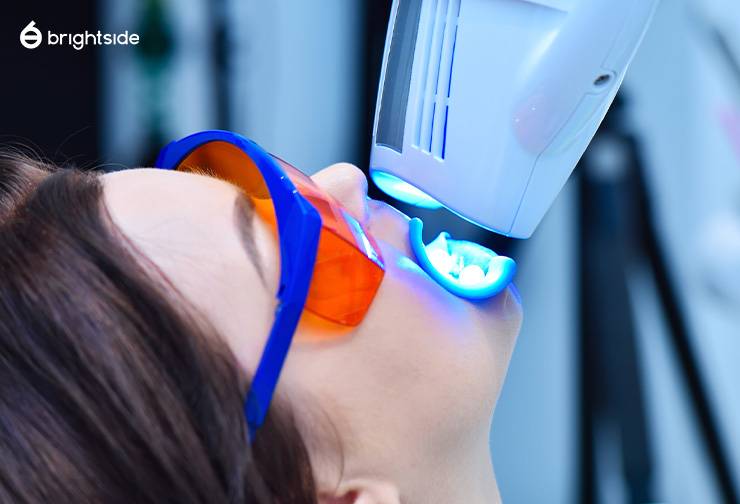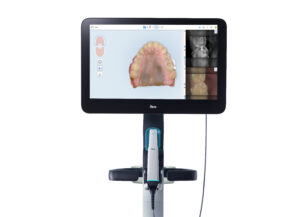Tooth discolouration is a common dental concern faced by many due to how easily it can occur. Not only does it impact the aesthetics of one’s smile, but it can also have detrimental effects on a person’s confidence. Fortunately, thanks to the availability of teeth whitening treatments, achieving a bright and white smile isn’t difficult. But before we dive into the details of teeth whitening, let’s first take a look at the causes of tooth discolouration so that you can work on addressing them to prolong your results!
1.1. Teeth Stains and Discolouration
Tooth discolorations are categorised into three types according to how they surface and how they can be dealt with. By gaining a deeper understanding of the causes, you’ll be able to identify the appropriate solutions to whitening your teeth. Here’s a closer look:
- Extrinsic Stains

Extrinsic tooth stains affect the surface of the tooth, known as the enamel—a protective layer that shields the underlying dentin. While it guards your teeth against damage, it is susceptible to pigments found in food, beverages, and tobacco. When these external elements accumulate, they can cause your teeth to discolour. Some of the most common culprits include coffee, tea, red wine, berries, certain sauces, as well as the tar and nicotine content in cigarettes. Without proper care and maintenance, these residues can create a yellowish tint on your teeth or even manifest as brown patches that diminish the natural brilliance of your smile.
- Intrinsic Stains
In contrast to extrinsic stains, which stem from external factors, intrinsic stains originate within the tooth’s inner layer, the dentin. This type of discolouration occurs when particles penetrate and accumulate deep within the tooth structure. They may be associated with problems such as tooth decay, and are usually more challenging to address through routine oral hygiene practices. In such cases, professional teeth whitening treatments may be sought.
- Age-Related Stains
As we age, our teeth undergo changes that increase our risk of experiencing discolourations, both extrinsic and intrinsic. The enamel gradually erodes over the years, exposing the dentin underneath. Being naturally yellow in colour, the dentin becomes more prominent in the process. The thin enamel also increases the teeth’s susceptibility to extrinsic staining agents. These cumulative effects result in the dulling of the teeth, impacting the aesthetics of an individual’s smile.
1.2. How to Maintain White Teeth?

Although the substances that we are frequently exposed to are difficult to eliminate entirely, it doesn’t mean that you’ll have to live with discoloured teeth for life. There are ways to combat them and maintain white teeth while still enjoying your favourite foods.
- Maintain Good Oral Hygiene
Brush your teeth at least twice daily with fluoride toothpaste and a soft-bristled toothbrush. You’ll want to avoid using hard and abrasive toothbrushes as they can cause damage to your enamel, wearing them down over time.
Flossing every night before brushing your teeth is also crucial to remove plaque and debris between teeth, which will then be removed by brushing. This helps prevent the buildup of stains and maintains the overall health of your gums and teeth.
For additional cleanliness, rinse your mouth or brush your teeth after meals to eliminate any food particles. This is particularly important after consuming acidic or staining foods to stop them from lingering on your teeth and causing discoloration. However, in the case of acidic foods, it’s important not to brush your teeth immediately after as it can damage your enamel. You may wish to simply rinse your mouth, or brush only after 30 minutes.
- Hydrate
Water is essential for your overall health, but did you know that it also plays a role in maintaining white teeth? Drinking water helps rinse away food particles, acids, and sugars that can contribute to tooth discoloration. It also promotes saliva production, which aids in neutralising acids and protecting tooth enamel.
- Dietary Choices
One straightforward way to maintain white teeth is to cut down on the consumption of foods and beverages known to stain teeth, such as red wine, coffee, tea, dark berries, and coloured sauces. But if you do indulge, the staining effects can be minimised by rinsing your mouth or brushing your teeth after.
Additionally, consider including crunchy fruits and vegetables like apples, carrots, and celery in your meals. Chewing these foods can help to remove surface stains and stimulate saliva production.
- Teeth Whitening Treatments
When all else fails and you’re left with unsightly discoloured teeth, professional teeth whitening treatments performed by dentists offer a solution. They are safe and are able to provide noticeable results to help you regain confidence.
What to Expect at Teeth Whitening
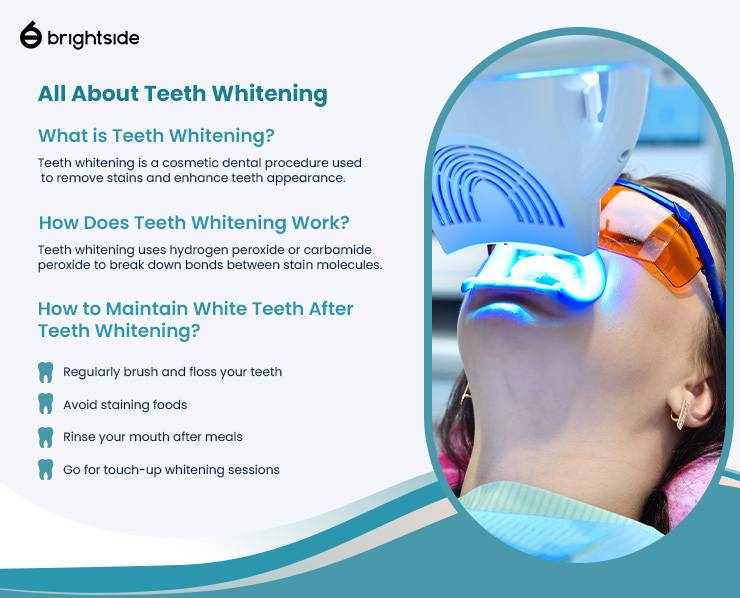
2.1. What is Teeth Whitening?
Teeth whitening is a widely sought-after cosmetic dentistry procedure designed to give you a smile makeover by removing stains and discoloration to help individuals achieve a brighter set of teeth. It typically involves the use of whitening agents to break down and remove stains that accumulate on the tooth enamel over time.
2.2. How Does Teeth Whitening Work? Is it Effective?
Teeth whitening procedures are generally effective as they utilise substances, namely hydrogen peroxide and carbamide peroxide, that penetrate the tooth enamel and target discoloured molecules within the teeth structure.
The oxygen present in these whitening agents reacts with the molecules that cause discolouration, initiating an oxidation process that breaks down the bonds that hold them together. This results in a reduction or elimination of stains on the tooth enamel.
The efficacy of these teeth whitening solutions also depends on factors such as the concentration of the whitening agent, the duration of treatment, and the nature of the stains. Teeth whitening administered by dentists in dental clinics often employ higher concentrations of bleaching substances, ensuring a more potent and efficient outcome compared to over-the-counter products. However, its success is also limited by the type of stain being addressed. Intrinsic stains, for example, stem from ageing or the consumption of certain medications. These are harder to remove even with teeth whitening.
2.3. Common Misconceptions About Teeth Whitening
While teeth whitening is effective and safe, many still steer clear of it due to the few misconceptions they’ve heard about the procedure. We’re here to clarify them.
- Misconception 1: Whitening Your Teeth Damages Your Enamel
It is believed that the teeth whitening process can damage tooth enamel. While some over-the-counter whitening products may carry that risk if misused, professional teeth whitening procedures performed by dentists are generally safe and do not harm the enamel.
Teeth whitening gels used in dental clinics are carefully formulated to balance effectiveness with safety. The active ingredients are applied in controlled concentrations, and progress is closely monitored to ensure optimal results without compromising the integrity of teeth enamel.
- Misconception 2: Teeth Whitening Guarantees Permanent Results
Professional teeth whitening gives you a smile makeover by significantly enhancing the radiance of your teeth, but its effects are not necessarily permanent as new stains can accumulate over time depending on your lifestyle habits. You’ll have to continually take steps to care for your oral health in order for the results to last long. This includes regularly brushing, flossing, and going for dental check-ups.
But fret not, for this doesn’t mean that teeth whitening is ineffective. While gradual discolouration may occur if you neglect your teeth and gums, it’s unlikely that they’ll return to their original colour immediately after whitening. If you’re worried about losing the whiteness of your teeth, you can schedule periodic touch-up appointments and give your oral cavity more care.
Maintaining White Teeth After Teeth Whitening
- Touch-Ups
Periodic touch-up whitening sessions, whether performed by dentists in a dental clinic or by yourself with take-home whitening kits, can help retain the whiteness of your teeth.
- Maintain Good Oral Hygiene

Regular brushing and flossing are crucial for preventing the buildup of plaque and stains on the enamel. Use a fluoride toothpaste to strengthen your enamel and fortify its resistance to staining substances.
- Avoid Staining Foods
Limit your consumption of coffee, tea, red wine, berries, and dark-coloured sauces to prevent them from staining your teeth.
- Misconception 3: Teeth Whitening Causes Tooth Sensitivity
Tooth sensitivity is a subjective experience, and what may cause discomfort for one person may not affect another. Sensitivity after whitening is often attributed to the active ingredients present. While breaking down stains in the tooth, they may affect the nerves within the teeth depending on factors such as the individual’s dental health, the concentration of the whitening agent used, and the treatment duration.
In many cases, professional teeth whitening, when performed by a qualified dentist, is designed to minimise the risk of sensitivity. Dentists take precautions to protect the gums and surrounding tissues during the procedure, and may use desensitising agents or recommend toothpaste specifically formulated to reduce sensitivity.
- Misconception 4: UV Light is Effective for Whitening Teeth
Due to misleading information online, many believe that ultraviolet (UV) light plays an important role in whitening teeth. The truth is, it doesn’t have a direct impact on the shade of your teeth. Rather, it is the active ingredients in the whitening agents that make a difference.
Some teeth whitening solutions, especially those over-the-counter options, may incorporate UV light as a marketing strategy or to create the perception of enhanced efficacy.
In dental offices, dentists do not rely on UV light to whiten teeth. Instead, they focus on controlled amounts of whitening gels and may use advanced technologies such as LED lights that are specifically designed to activate the whitening process.
- Misconception 5: Whitening My Teeth Makes It Look Unnatural
Teeth whitening is not a one-size-fits-all procedure; it’s a gradual process that allows individuals to control the level of whiteness they desire. Hence, you can choose to stop the treatment whenever you’re satisfied with the level of brightness achieved.
Usually, dentists will also discuss your preferred outcomes with you before commencing treatments. This collaborative approach ensures that the whitening process aligns with your goals and comfort level, without making your teeth look unnatural.
Should You Go for Teeth Whitening?
A radiant, white smile is not just a cosmetic procedure used to enhance your appearance. It also offers a host of other advantages that contribute to your physical and mental well-being. Need a reason to commit to a teeth whitening treatment? We share more about its benefits below.
3.1. Benefits of Getting Your Teeth Whitened
- Boost Self-Esteem and Confidence

Perhaps the most immediate and noticeable effect of teeth whitening is the revitalised image powered by the brightened smile. This aesthetic improvement brings about a boost in self-esteem and confidence that makes you more inclined to share your smile with others. You are also more likely to engage in social interactions that can positively affect your personal and professional relationships.
- Improve Oral Health
Teeth whitening isn’t purely a cosmetic procedure because it can actually contribute to improving oral health by thoroughly cleaning the teeth to remove plaque, tartar, surface stains and discolouration.
By eliminating these substances, teeth whitening supports a cleaner and healthier oral environment. This will in turn benefit the gums, reducing the risk of inflammation and gingivitis.
- Easier Maintenance of Oral Health
Apart from keeping your teeth and gums clean, teeth whitening also reinforces the strength of your teeth and reduces the presence of bacteria in your oral cavity. Not only will this help with preventing the formation of plaque and the development of dental issues, it also makes it easier to maintain good oral health.
- Fast and Long-Lasting Results
The speed at which results are achieved is another advantage of teeth whitening. In just a single session, noticeable improvements in tooth colour can be seen. Moreover, with proper care, the results can be very long-lasting. This serves an ideal option for those looking for a quick whitening solution prior to any important occasions.
3.2. Professional Teeth Whitening vs Take-Home Whitening Kits
While teeth whitening treatments generally offer the above-mentioned benefits, their efficacy depends on a number of factors that include the type of solution and the person performing the procedure.
There are two smile makeover routes to choose from: professional teeth whitening in dental clinics or over-the-counter whitening products. We’ll dive deeper into each option to help you decide which to go for.
Learn More: The Effectiveness of Teeth Whitening Home Remedies
- Treatment Time and Results
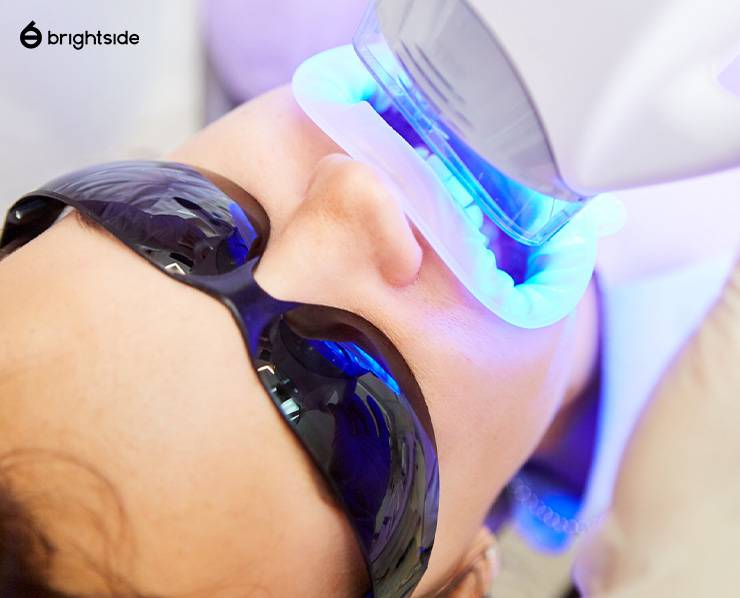
In-office teeth whitening procedures performed by dentists often yield faster results. Although each session takes about an hour to complete, noticeable improvements can usually be observed in a single session. This is because the professional-grade whitening agents used in dental clinics are often stronger and employed properly.
Over-the-counter kits, while effective too, usually require an extended treatment period due to the lower amounts of active ingredients in them.
- Cost of Whitening
Professional teeth whitening cost is undoubtedly higher compared to over-the-counter kits. This is due to the expertise dentists can offer, as well as the use of high-quality materials and results achieved during in-office treatments.
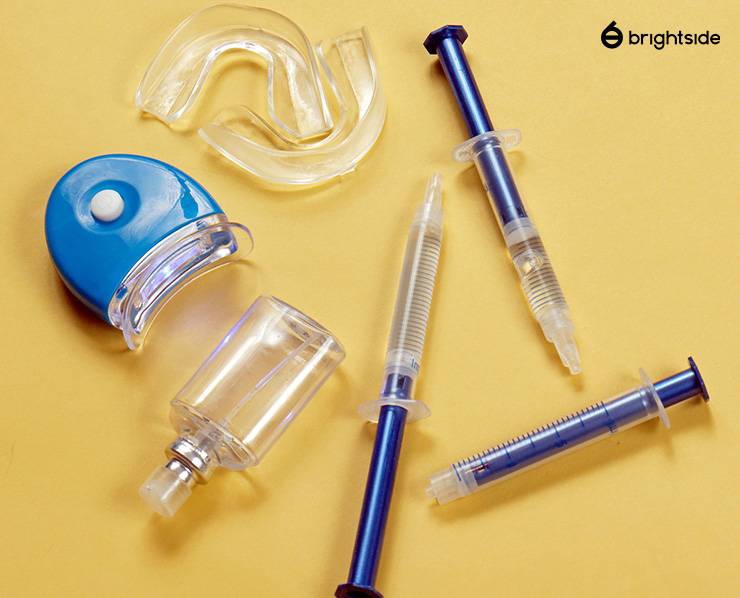
Over-the-counter teeth whitening kits are often more budget-friendly, making them an attractive option for individuals seeking a more economical approach to teeth whitening. However, it’s important to consider that the lower cost may accumulate into a larger sum in the long run as more whitening sessions may be required to reach your desired outcomes.
- Complementary Use
In some cases, dentists may recommend take-home teeth whitening kits to complement in-office treatments. Usually, these products are specially formulated by the dental clinics to offer efficacy and a hassle-free experience. You may even choose to replace a number of your in-office treatments with the whitening kits to save time and cost.
Alternatively, over-the-counter products designed for home use can also be a suitable option for those who value convenience and flexibility.
Learn More: Teeth Whitening: Professional Whitening or DIY?
3.3. Finding A Reliable Teeth Whitening Treatment
Not all teeth whitening services are created equal, and finding a reliable provider is crucial for both safety and optimal results. Here’s how to identify a trustworthy treatment option.
- Choose Treatments Offered by Dentists
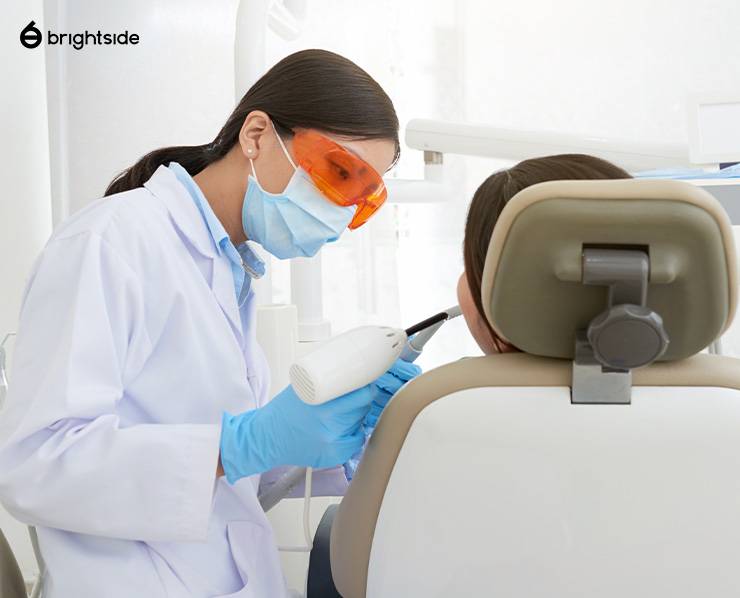
If you’re planning to get your teeth whitened, we suggest going to a dentist to have the treatment performed by a qualified medical professional. They possess the expertise to assess your oral health, recommend appropriate whitening methods, and ensure the safety of the procedure. Avoid visiting unlicensed practitioners that may lack the necessary skills and knowledge.
- Research the Whitening Procedure and Follow-Up Care
Inquire about the specific teeth whitening procedure offered by the dentist. A reputable provider will be transparent about the process, detailing the products used, the treatment duration, and any potential side effects. Additionally, ask about follow-up care instructions to find out if the clinic provides aftercare services to help you maintain your results.
- Evaluate Dentist’s Track Record
Research more about the clinic’s track record and experience in dental care and teeth whitening. Look for reviews and testimonials that clearly indicate the dentist’s experience and services.
- Consider the Cost
Cost is often the sole determinant for many. However, it shouldn’t take precedence, for the safety and health of your oral cavity matters most. If you do wish to compare prices, take note to also consider the quality of service and the dentist’s expertise to ensure that you’re getting the most bang for your buck.
- Treatment Options Available
Ask whether the clinic exclusively offers in-office teeth whitening or if they provide take-home kits as well. The availability of take-home options allows you to complement your treatment sessions with further touch-ups within the comforts of your own home. This grants greater flexibility and customisation based on individual preferences and needs.
- Schedule a Consultation
Before committing to a teeth whitening treatment, schedule a consultation with the dentist. This provides an opportunity to discuss your goals and ask questions, which can be pivotal in helping you make your decision.
Frequently Asked Questions About Teeth Whitening Treatments
- How does teeth whitening work?
Teeth whitening involves the use of ingredients like hydrogen peroxide and carbamide peroxide to break down and remove stains on the teeth. Usually, the dentist will apply a thin layer of the whitening agent on your teeth and employ LED lights to activate the whitening process.
- Is teeth whitening safe?
Yes. When performed by an experienced dentist, teeth whitening is generally safe. Dentists will also take steps to ensure no harm is caused to your oral cavity during the procedure. If you’re using over-the-counter products, do so with caution.
- How long does the teeth whitening process take?
One in-office treatment usually takes about an hour, while at-home kits may take a few weeks for results to show. However, to achieve your desired results, you may be required to return to the clinic for more than one session of teeth whitening.
- Are there any side effects of teeth whitening?
Temporary tooth sensitivity is a common side effect that will usually subside after treatment. Dentists will also take steps to reduce sensitivity during the procedure.
- How often should I whiten my teeth?
This depends on individual factors. Generally, touch-ups every six to 12 months can help maintain results.
- Can anyone get teeth whitening?
While many people are eligible for teeth whitening, not everyone is suitable for the procedure. For instance, those with certain dental conditions. Pregnant ladies or breastfeeding mothers should also avoid teeth whitening as a precaution. Do speak with your dentist to ascertain your suitability.
- Do whitening toothpaste and mouthwashes work?
Off-the-counter whitening products like toothpastes and mouthwashes may help remove surface stains, but are usually less effective than professional treatments.
- How long do teeth whitening results last?
Results can last from a few months to a few years, depending on a number of lifestyle factors like diet and oral hygiene.

Embarking on the journey towards a radiant and white smile is a venture that requires plenty of consideration. There are lots to note about this dental procedure, and it’s important to carefully think through your needs and options before committing to a teeth whitening treatment.
Now that you’re equipped with all you need to know about dental teeth whitening, it’s time to take that step towards brightening your smile.
Brightside Dental is a dental clinic located in Central Singapore that specialises in whitening teeth professionally. Our dentists are experienced in all things oral health and are capable of helping you achieve whiter teeth without causing harm to your teeth and gums. Gain confidence and smile brighter by scheduling your first consultation with us today!
